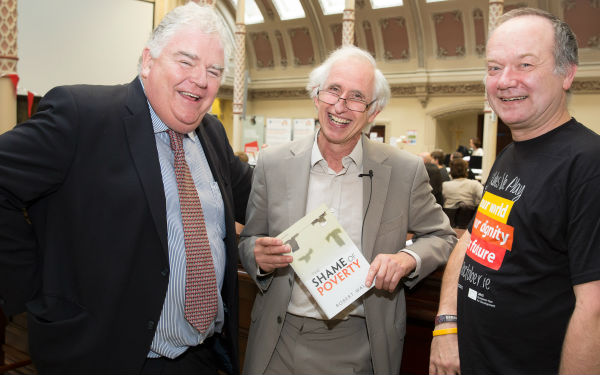Concept of ’shame’ is Core Experience For All People Living in Poverty Worldwide
Posted on: 19 October 2015
The concept of ‘shame’ is the core experience for people living in poverty worldwide whether they live in urban Norway or rural Uganda, according to a social policy expert who will present his research at a public event in Trinity College Dublin on Friday, October 16th, 2015 to mark International Day for the Eradication of Poverty (October 17th).
At the public event, Robert Walker, Professor of Social Policy, University of Oxford, reported on research he conducted on the experience of poverty in diverse settings: rural Uganda and India; urban China; Pakistan; South Korea and United Kingdom; and small town and urban Norway. In his research he found that the lived experiences of poverty were very similar, despite massive disparities in material circumstances in the different settings and varied cultural traditions and political systems. The concept of ‘shame’ was an experience shared by all people living in poverty across these diverse settings.
This experience of shame can have negative consequences which go far beyond material and physical well-being, leading to depression and in some cases suicide and may in fact contribute to the continuing cycle of poverty, according to Professor Walker.

Professor Walker’s research challenges conventional thinking on poverty and in his talk he will look at how to break the continuing cycle of poverty and how public policies can be less focused on stigmatisation and more on agency, which would promote the dignity of those living in poverty. His lecture, entitled “The Shame of Poverty”, was followed by an interview with Joe Little, Religious & Social Affairs Correspondent with RTE.
“People in poverty typically feel deeply ashamed at being unable to fulfil their personal aspirations or to live up to societal expectations due to their lack of resources. Such shame not only hurts, adding to the negative experience of poverty, but undermines confidence and individual agency, can lead to depression and even suicide, and may well contribute to the perpetuation of poverty.”
“Poverty-related shame is structural. People in poverty are repeatedly exposed to shaming by the attitudes and behaviour of the people they meet, by the tenor of public debate that labels them as lazy, and through their dealings with public agencies. Public policies that stigmatise people in poverty are, because they erode individual agency, likely to be less effective than ones promoting dignity.”
The event has been organised to mark International Day for the Eradication of Poverty, by the Trinity International Development Initiative, in partnership with the School of Social Work & Social Policy, in Trinity and ATD Fourth World.
Poverty remains one of the critical issues for global development. Nearly half of the world’s population, which equates to more than 3 billion people, live on less than $2.50 a day. More than 1.3 billion live in extreme poverty – less than $1.25 a day. 1 billion children, nearly half of all children worldwide, are living in poverty and, according to figures compiled by UNICEF, 22,000 children die each day due to poverty.
Professor Robbie Gilligan, Professor of Social Work and Social Policy, said: “Poverty remains one of the great social challenges of our times, and often lies at the root of major conflicts around the world. Very often, public debate surrounding poverty engages in a rhetoric which labels those living in poverty as being responsible for their situation. This ignores the often wide and complex reasons for poverty and the role that policy plays in creating and maintaining income inequality and also further stigmatises people living in poverty.”
Mark Hogan, Chair of ATD Fourth World Board added: "ATD Ireland is grateful that TIDI and the School of Social Work and Social Policy made it possible to welcome Professor Walker to Trinity. We are confident that his Irish visit will enable many stakeholders of the social work and development sectors to look in a new way at the challenges in creating needed pathways from shame to dignity."
Media Coverage:
